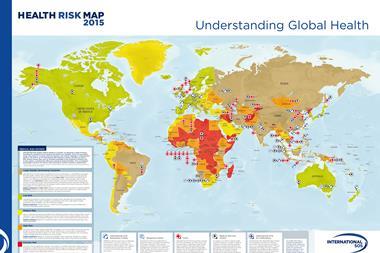With the disease spreading further and further, corporate policyholders would be wise to assess their insurance coverage

Companies with significant Ebola-related risks need to take time to consider whether they have appropriate insurance coverage in place for all aspects of their business.
Consider, for example: (1) a diamond mine in Sierra Leone placed under regulatory quarantine, forcing the suspension of its day-to-day business operations; (2) a global chocolate manufacturer unable to access its usual supply of cocoa from the Ivory Coast because of border restrictions between the Ivory Coast and neighbouring Liberia; or (3) an employee from a European office of a large bank contracting Ebola while on business in Nigeria.
Types of cover
- Business interruption (BI): standard BI cover is triggered only after the policyholder has suffered damage to the premises for which property cover has been purchased. An Ebola outbreak is unlikely to constitute property damage, meaning a standard BI policy will not respond to the incident set out in our diamond mine example.
- Some insurers, however, have extended their policies to cover business interruption losses attributable to the outbreak of diseases, but the wording is usually based on “notifiable human diseases”, so it is important to be aware that a public health bodies’ list of notifiable diseases will vary by jurisdiction. Cover may also be limited to situations where restrictions of the use of premises have been ordered by a local authority or similar government organisation following the outbreak of diseases that are covered.
- Denial of access: some businesses will have “add on” cover for denial of access claims where physical damage has not occurred. This cover provides for, among others, situations in which the army, police or a similar body prevent the use of the insured’s premises owing to a danger, and it is conceivable this might include danger to human health. The indemnity period (that is the maximum period of business interruption covered) for denial of access cover is often restricted to as little as three months.
- Supply chain: businesses should also look outside the organisation to risks facing other entities in their business supply chain. Those businesses that foresee supply chain difficulties may wish to review their supply chain policies to ensure they are up to date as many are based around named supplies and suppliers.
- Business travel insurance: the British Foreign Office advises against all but essential travel to countries in West Africa seriously affected by Ebola. Regard to travel policy wording will be important for those travelling to such countries as some insurers may exclude cover for travel where the Foreign Office has advised against it.
Employees should also be made aware that repatriation to their home country is not always possible for logistical reasons where borders are closed or infrastructure is affected, whether the desire to return home arises owing to the contraction of Ebola, or another illness.
- Employers’ liability insurance: there are no specific exclusions or conditions relating to any particular type of disease in compulsory UK employers liability policies. Therefore, where the insured is legally liable for disease caused to their employee during the policy period, this should be covered subject otherwise to the terms of the policy. This is likely to be relevant only if an employee contracts Ebola in the course of their employment and does not recover.
Assessing your insurance coverage for Ebola-related risks
1. Review terms of potentially applicable policies. Policyholders should attempt to identify any language, including exclusions, that an insurer might argue bars coverage for Ebola-related claims as well as language that may afford coverage, particularly a broadly defined denial of access or supply chain policy.
2. Strategy on policy renewals. Even if existing policy language appears to provide coverage for Ebola-related incidents, an insurer may seek to introduce Ebola specific exclusions on renewal. Policyholders should be asking their brokers if existing insurers are imposing Ebola restrictions and whether there are alternative insurers that are not.
3. Consider speciality Ebola policies if there is a gap in cover among the business’ existing policies. The business should closely review the terms of any such policy carefully to
understand the types of claims it will and will not cover.
4. Ensure appropriate policy limits and retentions. A company with elevated risks related to Ebola should consider whether, in light of national and global developments, its current policy limits are sufficient for its operations.
Identifying and reviewing any potentially applicable policies will be important when responding to an Ebola-related claim. In particular, policyholders should ensure any notification issues are understood and that other policy requirements are complied with such as claims co-operation provisions.
Jane Harte-Lovelace is a partner and Sarah Emerson is a senior associate at K&L Gates LLP




















No comments yet